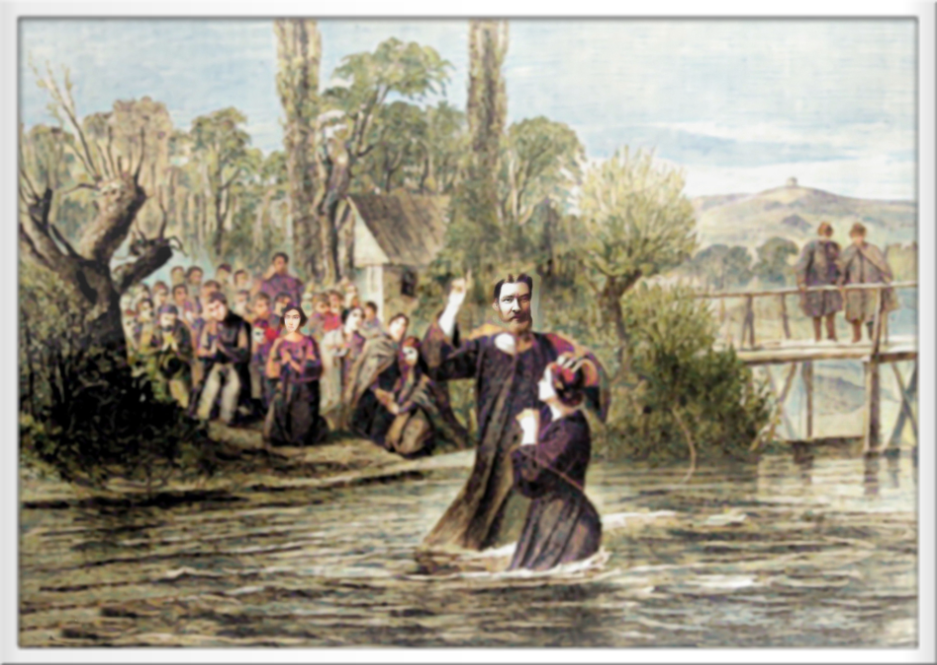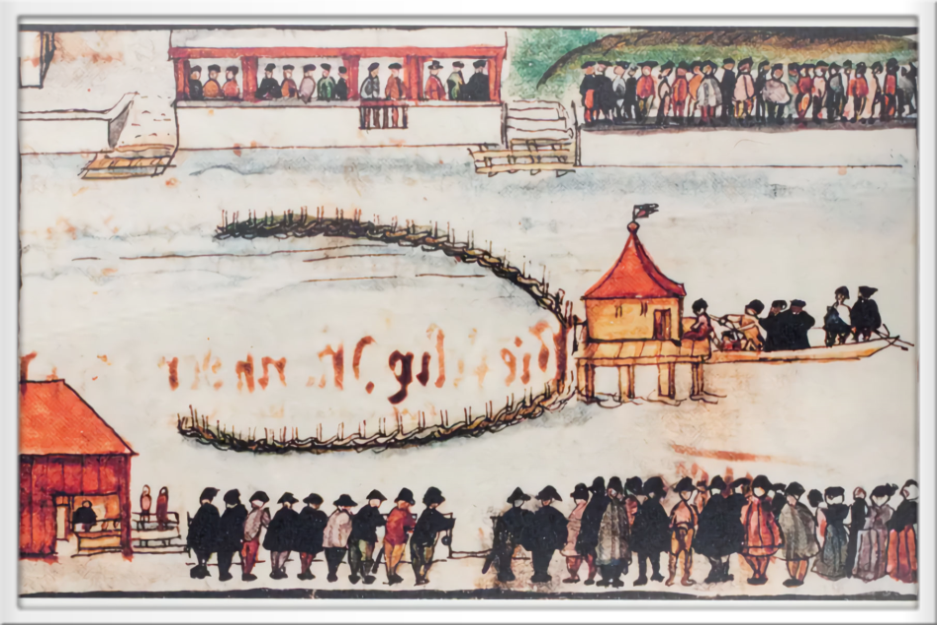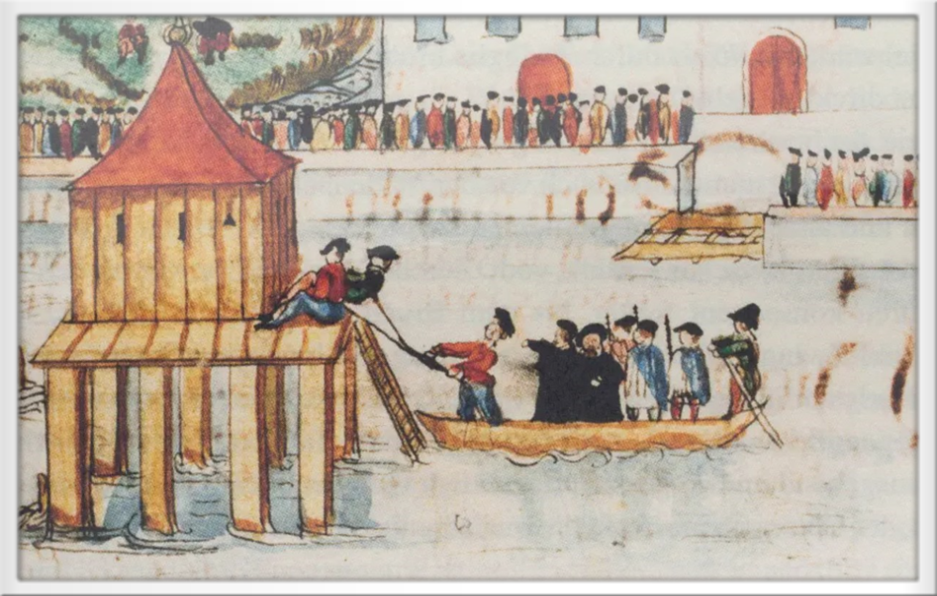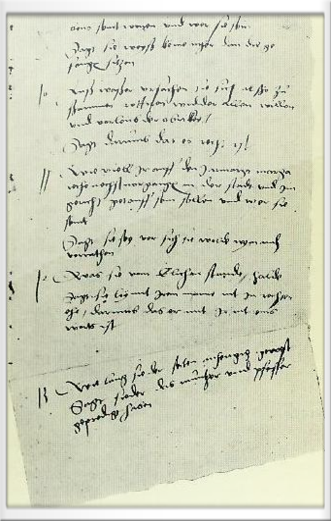Wiedertäufer 1537
Chronik 2 > Kirche
Hinrichtung von Wiedertäufern in Mühlhausen 1537
Katharina Schäfer aus Widdershausen war unter den 10 Täufern, die am 8. November 1537 in Mühllhausen in der Unstrut ertränkt und am Ufer verscharrt wurden.

Eine Erwachsenentaufe im Fluß nach Friedrich Ortlieb, ein deutscher Porträt- und Genremaler
Täufer in Thüringen um 1537
Das Täufertum fand seinen Weg nach Thüringen um 1527, offenbar aus Franken, wo Hans Hut tätig war. Das erste Oberhaupt der Thüringer Täufer war Hans Römer, ein Kürschner aus Eisenach. Nach ihm wurde sein Schüler Ludwig Spon aus Ershausen „die Seele der Bewegung“ in diesem Gebiet. Der Prediger Alexander, der ebenfalls in dieser Gegend taufte, wurde 1533 in Frankenhausen ergriffen und enthauptet, „eine der edelsten Gestalten des Täufertums“.
Anfang Mai desselben Jahres wurden sieben Täufer, darunter Ludwig Spon, in Mühlhausen und Treffurt eingekerkert, nachdem sie gewarnt worden waren, ihre Konventikel in den benachbarten Dörfern aufzugeben. Sie erklärten, dass sie lieber sterben würden als zu widerrufen oder ihre Brüder zu verraten. Wahrscheinlich wären sie hingerichtet worden, wenn Philipp von Hessen, der zusammen mit den Herzögen von Sachsen die Gerichtsbarkeit über die Region innehatte, nicht Einspruch erhoben hätte. Die sieben Gefangenen wurden eine Zeit lang von Balthasar Raidt, dem Pfarrer in Hersfeld, unterrichtet und nach einem halben Jahr freigelassen.
Fast augenblicklich begannen die Mühlhäuser Täufer, in der weiteren Umgebung der Stadt für ihre Sache zu werben. In dem Dorf Neunleiningen, zehn Meilen östlich, hatten sie guten Erfolg. Eine Reihe von Männern und Frauen wurde inhaftiert und im September 1534 vor Gericht gestellt. Durch die Aussagen der Gefangenen auf die Anwesenheit von Täufern in Mühlhausen aufmerksam gemacht, begann die Verfolgung in der Stadt von neuem. Ein Bürger von Mühlhausen, Klaus Scharf, verriet auf der Folterbank die Namen seiner Brüder; sie wurden verhaftet, aber bald wieder freigelassen, als der Stadtrat von ihrer Unschuld überzeugt war. Auch Klaus Scharf wurde freigelassen, hielt aber wieder Täuferversammlungen in seinem Haus ab.
Ein Zentrum für die Täufer in der Stadt war eine Zeit lang das Haus von Barbara Meissrod, die im Herbst 1534 von Heinz Kraut getauft worden war. Anfang 1535 taufte Peter Reusse mehrere Frauen aus Mühlhausen. Versammlungen fanden auch im benachbarten Gunzelhof statt, wo sich bis zu 20 Personen gleichzeitig versammelten und der Prediger Mattes taufte. Die Täufer der Stadt trafen sich auch in den Wäldern.
Das Anwachsen der Bewegung in Mühlhausen erregte 1537 erneut den Zorn der Obrigkeit; Barbara Meissrod und einige andere, die sich in ihrem Haus versammelt hatten, wurden verhaftet und auf der Folterbank untersucht. Weitere Verhaftungen folgten. Georg, Herzog von Sachsen, der als Schirmherr der Stadt sofort über die Angelegenheit informiert wurde, ordnete die sofortige Hinrichtung der Täufer durch Ertränken an. Am 8. November 1537 wurden zehn von ihnen hingerichtet; sie wurden in die Unstrut geworfen und ihre Leichen am Ufer begraben.

Der Täufer Felix Manz wird am 5. Januar 1527 in der Limmat bei Zürich ertränkt, er war ein Mitbegründer der Zürcher Täuferbewegung und einer ihrer frühen Märtyrer.
Ein symbolisches Ende für einen, der das Wasser der Taufe in den Mittelpunkt seines Glaubens gesetzt hatte. Heinrich Thommann, Abschrift Bullingers Reformationschronik, 1605
Ein symbolisches Ende für einen, der das Wasser der Taufe in den Mittelpunkt seines Glaubens gesetzt hatte. Heinrich Thommann, Abschrift Bullingers Reformationschronik, 1605

Hinrichtung zweier anderer Täufer, die in der Limmat, an der selben Stelle, einem Fischerhäuschen, wie Felix Manz in Zürich ertränkt wurden. Heinrich Thommann, Abschrift Bullingers Reformationschronik, 1605
Unter den Opfern am 7. November in Mühlhausen waren:
Barbara Meissrod (am 11. Oktober auf der Folterbank verurteilt),
Jakob Storger,
Appolonia Kaiser,
Katharina Schäfer aus Widdershausen,
Martha Scharf
Klaus Scharf
Tele Obelecker
und drei weitere Frauen.
Sie gingen singend „Nun bitten wir den Heiligen Geist“ in den Tod. Auf dem Weg zu ihrer Hinrichtung sollen sie den Zuschauern Worte zugerufen haben, die die Kindertaufe und die Messe verunglimpften, sowie einen Aufruf zur Buße. Einige Tage später, am 17. Januar 1538, wurden zwei weitere Täufer
Hans Hentrock von Amra und
Ottilia Goldschmidt,
sowie ein Mädchen aus Mühlhausen, an der gleichen Stelle hingerichtet. Vier von ihnen wurden aus der Stadt vertrieben.
Dieses Vorgehen des Terrors löschte die Täuferbewegung in Mühlhausen offenbar aus. Doch nach dem Tod Georgs im Jahr 1539, als die Reformation in der Stadt eingeführt wurde, wurden auch die Täufer wieder aktiv, zumal Sebastian Thiel, der Pfarrer von Niederrode bei Mühlhausen, der Bewegung nicht unfreundlich gesinnt war. Thiel wurde zwar auf Betreiben von Justus Menius, der 1542 mit der Reform der Kirche beauftragt worden war, für seine Haltung bestraft, aber die Täuferbewegung lebte dennoch wieder auf, zum Leidwesen des Eisenacher Superintendenten, der in den zwei Jahren seiner Amtszeit keine Mühe scheute, die Bewegung in Wort und Schrift auszurotten. Die Prediger wurden aufgefordert, von der Kanzel gegen sie zu predigen und für ihre Bekehrung zu beten. Er schrieb eine neue Streitschrift, Von dem Geist der Widertäufer, die er am 3. April 1544 dem Rat der Stadt widmete.
Diese Broschüre hatte die gewünschte Wirkung. Mehrere Bürger und Bauern wurden verhaftet und von den Predigern ins Kreuzverhör genommen. Diejenigen, die sich weigerten zu widerrufen, wurden ins Gefängnis geworfen; unter ihnen war Ludwig Spon, der erneut an der Spitze der Bruderschaft stand. Ein Jahr später wurden sechs Brüder verhört, darunter Christoph von der Eichen, der wiederholt inhaftiert wurde und nur durch das Eingreifen Philipps dem Tod entging. Er wurde mit seiner Familie aus Mühlhausen verbannt, tauchte aber immer wieder in der Stadt und der Umgebung auf, offenbar als Anführer, während Ludwig Spon aus den Akten verschwand.
Bis in die 1570er Jahre scheint sich ein kleiner Rest unter der Leitung von Christoph von der Eichen gehalten zu haben, der den Behörden von Mühlhausen große Sorgen bereitete. Die Klagen der Pastoren waren unaufhörlich. Im Jahr 1564 verpflichteten sich die beteiligten Regierungen, ernsthafte Schritte zu ihrer Ausrottung zu unternehmen. Am 16. September wurden die Täufer zu einem Kreuzverhör vorgeladen, zu dem 12 Personen erschienen, darunter Christoph von der Eichen. Sie wurden ausführlich befragt und streng ermahnt, von ihrem „schrecklichen Irrtum“ abzulassen, aber vergeblich. Christoph von der Eichen wurde mehrmals verhört und schließlich Anfang der 1570er Jahre als „Erz-Täufer“ in Langensalza hingerichtet. Das gleiche Schicksal ereilte den letzten Täufer, der in Mühlhausen überliefert ist, Hans Dohn von Lauterbach, der sich mit seinem Bruder in der Nähe aufhielt und dessen Lehre einen seltsamen dualistischen und antitrinitarischen Charakter hatte.
Nach der Mitte des 16. Jahrhunderts gab es neben der Täuferbewegung eine libertinistische Gruppe, die „Blutfreunde“, die Justus Menius in seinem Buch Von den Blutsfreunden aus dem Widertauff (Erfurt, 1551) mit den Täufern in Verbindung brachte; aber die Kreuzverhöre der verhafteten „Blutfreunde“ zeigten, dass sie keinen Anteil an der Erwachsenentaufe haben wollten und die Lehren der Täufer angriffen (Wappler, Thüringen, 190, 193, 205). Mehrere „Blutfreunde“ wurden 1551 in Mühlhausen verhaftet, von denen einer wahrscheinlich auf dem Scheiterhaufen starb, und andere wurden aus der Stadt verbannt. Diese Gruppe fügte dem Ruf der Täufer in Nordthüringen irreparablen Schaden zu.
Für die Täufer in Nordthüringen und am Harz war Mühlhausen ab 1535 ein Zentrum. Anstelle von Heinz Kraut und Georg Köhler war ein gewisser Matthes der Anführer. Anfang Oktober 1537 ging der Rat der Stadt Mühlhausen gegen diese Konventikel vor. Zehn der verhafteten Männer und Frauen wurden in der Unstrut ertränkt und vier aus der Stadt verwiesen. Von den übrigen vier Gefangenen wurden zwei am 17. Januar 1538 ertränkt. Etwa zur gleichen Zeit fand in Brücken an der Helme (Landkreis Mansfeld-Südharz) eine Täuferhinrichtung statt. Aber noch immer verschwand das Täufertum nicht aus Nordthüringen. In den Jahren 1544-45 gab es erneut Täuferprozesse in Mühlhausen, aber jetzt wehrte sich Philipp energisch gegen ihre Hinrichtung.

Protokoll des Verhörs der Täuferin Apollonia Kaiser in Mühlhausen am 19.Oktober 1537
Der Mythos, der sich im Volk um die Gestalten Thomas Müntzer und Heinrich Pfeiffer zu ranken begann, wird hier in der Aussage der tapferen Apollonia Kaiser deutlich. Diese unbekannte Heldin verrät niemanden aus ihrer Gemeinschaft. Lieber behauptet sie beim Verhör, sie sei für sich allein. Aber gemeinsam mit dem Täufer Jakob Storger und weiteren Gesinnungsgenossen geht sie am 8.November 1537 in den Märtyrertod.
Noch elf Jahre nach dem Bauernkrieg klangen den Herrschenden die Namen der Aufrührer Müntzer und Pfeiffer als viel zu gefährlich in den Ohren. Diese Gefahr sollte durch das gewaltsame Ertränken einer kleinen Gruppe von unpolitischen Wiedertäufern in der Unstrut vor der Stadt Mühlhausen gebannt werden.
Selbst Frauen verschonten die Häscher dabei nicht.
Quellen:
Hege, Christian und Christian Neff. Mennonitisches Lexikon,
4 Bde. Frankfurt & Weierhof: Hege; Karlsruhe; Schneider, 1913-1967: III, 173-175.
Wappler, P. Die Stellung Kursachsens und des Landgrafen Philipp von Hessen zur Täuferbewegung. Münster, 1910
Wappler, Paul. Die Täuferbewegung in Thüringen von 1526-1584. Jena: Gustav Fischer, 1913.
Leipziger Übersetzungen und Abhandlungen zum Mittelalter. Leipzig: Rütten & Loening, 1967, Seite 216
